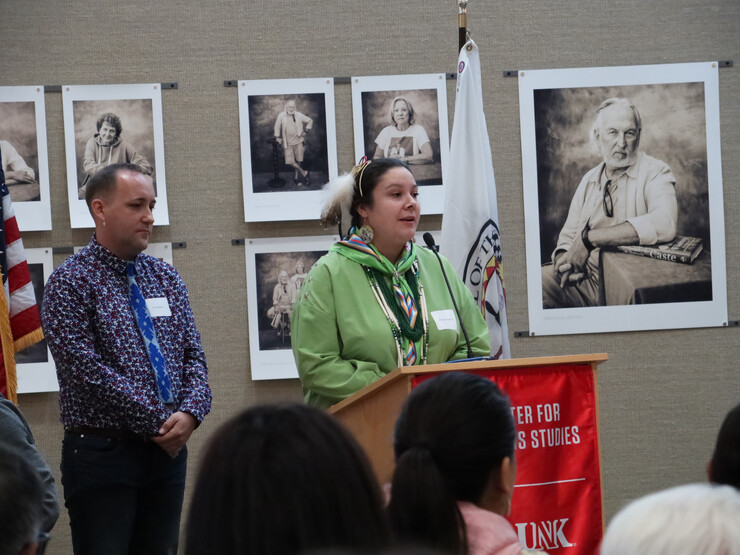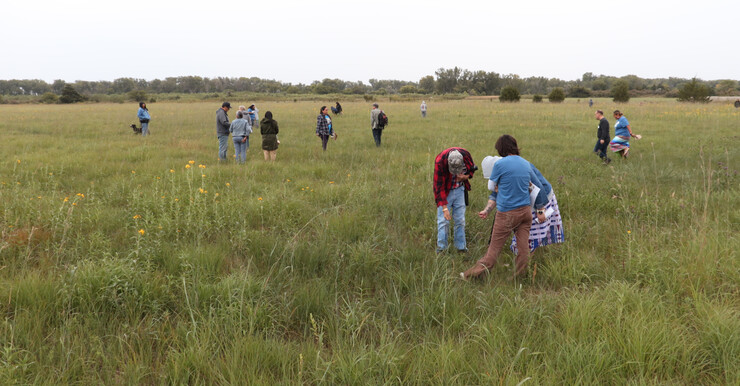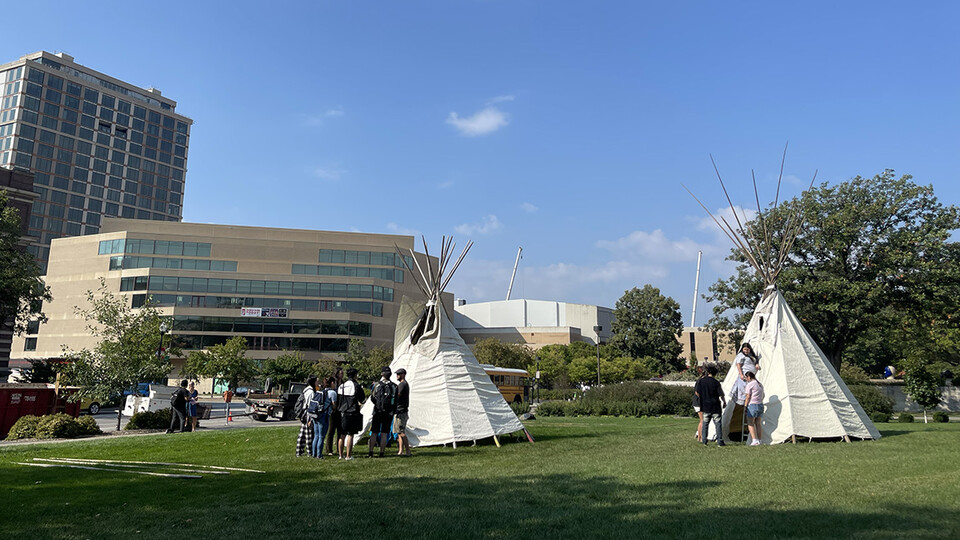Center for Great Plains Studies
Deann Gayman, November 29, 2023
Otoe-Missouria, Center for Great Plains Studies earn Mellon funding
The Otoe-Missouria Tribe once called the land around Salt Creek home, but the tribe was displaced in the 1800s. A new project, with funding from the Mellon Foundation’s Monuments Project, will continue reconciliation efforts to reconnect the tribe to the land where the city of Lincoln now sits.
The University of Nebraska–Lincoln’s Center for Great Plains Studies and the Otoe-Missouria Tribe, based in Oklahoma, have been awarded a three-year, $1.58 million grant from the Mellon Foundation to launch the project, “Walking in the Footsteps of Our Ancestors: Re-Indigenizing Southeast Nebraska.”
The project will build on recent reconciliation work led by the Center for Great Plains Studies that included the establishment of the annual Otoe-Missouria Day in Lincoln. Each Sept. 21, the tribe is welcomed home to the Lincoln area on the day their nation ceded the land that became the university and the city.
“Walking in the Footsteps of Our Ancestors” aims to:
- Survey the current commemorative landscape in Southeast Nebraska;
- Bring together the City of Lincoln, the university and the Otoe-Missouria nation to co-create new land- and relationship-based commemorations of Native peoples in the area;
- Document the process through film and other media to serve as a model for other communities.
Planned activities include a survey of area residents, an audit of current commemorations, the Confronting the Legendary Great Plains conference, the Decolonizing Museums lecture series in spring 2024, the third annual Otoe-Missouria Day, the “Contemporary Indigeneity” exhibition at the Great Plains Art Museum in fall 2025 and updates to commemorative signage in area parks and roadsides.
Otoe-Missouria Chairman John Shotton praised the project.
“We are excited to begin a new partnership with the University of Nebraska–Lincoln’s Center for Great Plains Studies,” he said. “We thank the Mellon Foundation for the support of this very important project reconnecting the Otoe-Missouria Tribe with our former homelands in Nebraska.”
Margaret Jacobs, Charles Mach Professor of History and director of the center, will serve as co-director and principal investigator for “Walking in the Footsteps of our Ancestors.” As a historian of Native peoples, she was working on the multimedia project “Reconciliation Rising” several years ago and was surprised to learn the history of the Otoe-Missouria Tribe and its connection to Southeast Nebraska.
“Many Indigenous people, their presence and place has been almost entirely erased,” Jacobs said. “I would venture to guess that most people who live here (in Lincoln) don’t know the tribe that ceded the land that became our city, our university. It was such a wake-up call for me that I wasn’t aware of it.”
Prior to settlers coming to Lincoln and Southeast Nebraska, people from many Indigenous nations hunted along Salt Creek and its tributaries and harvested salt from its deposits. By 1714, the Otoe had settled in a village on a Salt Creek tributary. In 1798, their relatives the Missouria joined them there. The Otoe-Missouria Nation signed two treaties with the U.S. government, on Sept. 21, 1833, and March 15, 1854, that ceded the land that became Lincoln and the University of Nebraska. The Otoe-Missouria moved in 1854 to the Big Blue reservation near Beatrice, but Congress sold the land and moved them to Indian Territory (in Oklahoma) in 1880 and 1881.

Christina Faw Faw Goodson, member of the Otoe-Missouria Tribe and Native language specialist with the National Indian Education Association, will join the project as co-director in January.
“In the Jiwere-Nut’achi Ich’e (Otoe-Missouria language), there are different ways to express thankfulness,” Goodson said. “To the Mellon Foundation, the University of Nebraska and the Center for Great Plain Studies, and my Otoe-Missouria Tribe, I say Warigroxiwi ki! — which literally means ‘I pray for/to you all’ and is the most formal heartfelt thank-you that can be expressed. I believe this project has the power to create lasting connections between the people and communities of Southeastern Nebraska and our Jiwere-Nut’achi people in Oklahoma and throughout the world.”
The City of Lincoln will also be involved and have been partners in establishing Otoe-Missouria Day.
“We are honored to be a part of the ‘Walking in the Footsteps of Our Ancestors’ collaboration between our partners at the University of Nebraska–Lincoln’s Center for Great Plains Studies and our friends and neighbors from the Otoe-Missouria Tribe of Oklahoma,” Lincoln Mayor Leirion Gaylor Baird said. “The City of Lincoln supports the Otoe-Missouria Tribe by acknowledging that our city is on its ancestral lands. This new collaboration will build on that support by helping to engage Lincoln residents and visitors around the important history and ongoing contributions of our Native peoples. We are grateful to the Mellon Foundation for their support of this vital project.”

Jacobs said the grant will allow established partnerships among the tribe and community to grow and that project participants endeavor to form many more partnerships moving forward.
“The grant will allow us to fund Otoe-Missouria commemoration, but also to create a sustainability plan, because it’s something we want to continue into infinity,” Jacobs said. “A lot of our budget is for bringing people together, because we need to have these conversations. I think a lot of unexpected things will grow very organically out of it.”
The Andrew W. Mellon Foundation is the nation’s largest supporter of the arts and humanities. Since 1969, the Foundation has been guided by its core belief that the humanities and arts are essential to human understanding. The Foundation believes that the arts and humanities are where we express our complex humanity, and that everyone deserves the beauty, transcendence, and freedom that can be found there. Through our grants, we seek to build just communities enriched by meaning and empowered by critical thinking, where ideas and imagination can thrive. Learn more.






